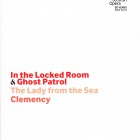Ghost Patrol 2012Scottish Opera
Read more about the opera Ghost Patrol
Ghost Patrol formed a substantial, hour-long, second part of the double-bill of new works (following In the Locked Room) which were launched by Scottish Opera at the Edinburgh Festival, followed by a further pair of performances in Glasgow. After that, Music Theatre Wales took over with conductor and soloists touring down south.
In Edinburgh, the Festival produced a programme for this double bill as well as individual programmes for each of the other new pieces, Clemency and The Lady from the Sea, that Scottish Opera were performing. To buy a programme for all four operas (excellent volumes containing complete libretti) cost £10.50. By contrast, for the Glasgow performances, a single volume was produced by Scottish Opera - all the same data for the four works, but a snip at £4.
The pairing of MacRae with established novelist Louise Welsh enjoyed a significant success with their first operatic effort, in Scottish Opera's 5:15 series. Remembrance Day, a needle-sharp wee thriller, was widely reckoned to be one of the most coherently successful of those fifteen short works .
Ghost Patrol proved to be a grippingly successful examination of the effects of post-traumatic stress on all personnel involved in warfare, including the families who have to pick up the pieces afterwards. The scoring for chamber orchestra was full of subtle detail and colouring, beautifully played under Michael Rafferty's direction. The three soloists gave totally committed performances in demanding roles. There was also some effective recorded background music - MacRae seems to like doing this - from a vocal quartet consisting of Shuna Scott Sendall, Marie Claire Breen, Jonathan Cooke and Ross McInroy.
The entire work is located in a modern and unatmospheric bar in an unspecified military town. During a dramatic prelude a man enters, clad in black, including balaclava - a terrorist? No, merely a burglar who starts to loot the place. Another man runs in (silently) and an extensive fight ensues. Burglar is at last defeated and unmasked. The victor is the bar owner, Alasdair, who now recognises his crestfallen opponent. Alasdair is a former army officer, the burglar is Sam, his erstwhile sergeant, now destitute. As they drink and the frost thaws, Alasdair's girlfriend Vicki, woken by the noise, enters, to be greeted by the news that Sam is their new barman. She expects they will be robbed again in future.
What becomes clear is that these retired soldiers are both deeply wounded by their experience. Not only do they come from military backgrounds, but Vicki does too - having seen at first hand the after-effects of war, she has only against her better judgment becove involved with an ex-soldier, though she has managed to keep him together so far. Alasdair has a drink problem, the bar is losing money, Sam and Vicki start an affair. Most importantly, Alasdair and Sam have memories dominated by a particular event during a tour of duty where they shot civilians during an incident. Their memories conflict as to the precise circumstances, and a drunken beawl ends in a fatal stabbing.
A lot is crammed into the hour, most of it very effectively. One quibble remains about the ending - the death seems almost a cliché of verismo style. Perhaps a more effective end would simply be to leave all the charracters alive, still struggling with their demons.

